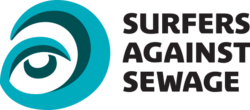Surfers Against Sewage
 | |
| Founded | 1990 |
|---|---|
| Focus | Environmental |
| Location |
|
Area served | United Kingdom |
Members | 20,000+ |
Key people | Hugo Tagholm, CEO |
| Website | sas.org.uk |
Surfers Against Sewage (SAS) is a marine conservation charity working with communities to protect oceans, waves, beaches and marine life.[2] It was created in 1990 by a group of Cornish surfers from the villages of St Agnes and Porthtowan on the north coast of Cornwall.[3]
History[]
Set up as a single-issue campaign group in 1990, Surfers Against Sewage led a nationwide campaign for improved water quality. Their campaign's success was helped by key pieces of EU legislation[4] including the Bathing Water Directive.[5]
In 2012, Surfers Against Sewage was recognised as a national marine conservation charity focused on the protection of waves, oceans, beaches, marine wildlife and coastal communities.[6]
In 2018 it was one of the seven charities nominated by Prince Harry and Meghan Markle to receive donations in lieu of wedding presents.[7][8]
Campaigns[]
Today the organisation represents an ever-expanding supporter base and campaigns on a diverse range of issues. SAS campaigns for both the UK's coastal environment and the health of all surfers and other recreational waters users. Recently, SAS has expanded its remit into the protection of the wave resource and surfing spots through the Protect Our Waves (POW) campaign. Since 1990, SAS has secured a multitude of campaign successes on behalf of all water users.
Plastic Free Coastlines[]
More recently, Surfers Against Sewage have turned their attention to battling the new sewage - plastic pollution. Through national initiatives such as the Big Spring Beach Clean[9] and the Autumn Beach Clean Series[10] they hope to empower communities to protect their coastlines. Further up in the chain of events, SAS are using their Waves All-Party Parliamentary Group (APPG)[11] to encourage politicians to explore and introduce policies to prevent plastic emissions from entering the environment.
Protect Our Waves[]
SAS launched the Protect Our Waves campaign to increase public awareness to the importance of waves in the socioeconomic fabric of many UK coastal communities.[12] Behind the scenes SAS has been consistently representing surfers and waveriders on rights of access, and ensuring the wave resource is recognised and valued.
Beach Bum Survey[]
| Wikinews has related news: |
Surfers Against Sewage helped recruit participants for a University of Exeter study on the prevalence of antibiotic-resistant E. coli in surfers and bodyboarders. The work was published in Environment International in January 2018.[13][14]
References[]
- ^ "Contact us". Surfers Against Sewage. Retrieved 14 March 2020.
- ^ "Mission statement and vision • Surfers Against Sewage". Surfers Against Sewage. Retrieved 2017-03-28.
- ^ "Surfers Against Sewage". Huck Magazine. 2014-07-07. Retrieved 2017-03-28.
- ^ "SAS History • Surfers Against Sewage". Surfers Against Sewage. Retrieved 2017-03-29.
- ^ Thorn, Rachael (2016-09-05). "Could Brexit affect beach water quality?". BBC News. Retrieved 2017-03-29.
- ^ "Killing Waves • Surfers Against Sewage". Surfers Against Sewage. 2013-01-22. Retrieved 2017-04-26.
- ^ "Royal wedding: Harry and Meghan ask for charity donations". BBC News. 9 April 2018. Retrieved 17 May 2018.
- ^ "Royal Wedding Charitable Donations". The Royal Household. Retrieved 17 May 2018.
- ^ "The Big Spring Beach Clean 2017 - Carvemag.com". Carvemag.com. 2017-03-28. Retrieved 2017-04-24.
- ^ "Autumn Beach Clean Series Archives • Surfers Against Sewage". Surfers Against Sewage. Retrieved 2017-04-24.
- ^ Commons, The Committee Office, House of. "House of Commons - Register Of All-Party Groups as at 30 July 2015 : Waves". www.publications.parliament.uk. Retrieved 2017-04-24.
- ^ "Protect Our Waves • Surfers Against Sewage". Surfers Against Sewage. Retrieved 2017-04-24.
- ^ Anne F.C. Leonard, Lihong Zhang, Andrew J. Balfour, Ruth Garside, Peter M. Hawkey,Aimee K. Murray, Obioha C. Ukoumunne, William H. Gaze (14 January 2018). "Exposure to and colonisation by antibiotic-resistant E. coli in UK coastal water users: Environmental surveillance, exposure assessment, and epidemiological study (Beach Bum Survey)" (PDF). Environment International. Retrieved 15 January 2018.CS1 maint: uses authors parameter (link)
- ^ University of Exeter (14 January 2018). "Surfers three times more likely to have antibiotic-resistant bacteria in guts". Eurekalert. Retrieved 15 January 2018.
External links[]
- Surfing organizations
- Surfing in the United Kingdom
- Organisations based in Cornwall
- Surfing stubs